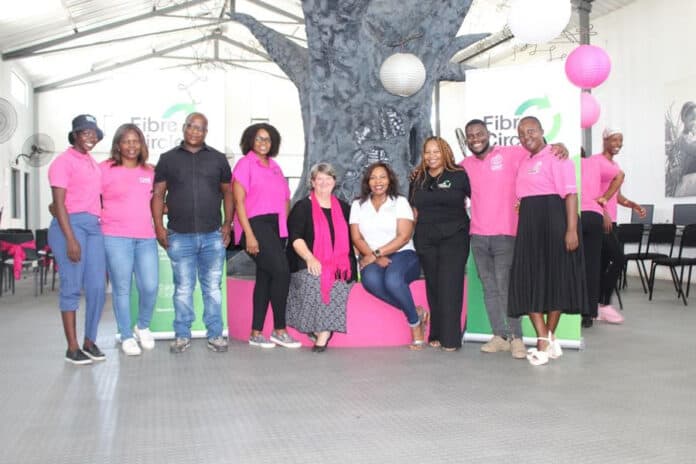Environmental education has received a welcome boost in rural Mpumalanga and the Free State, thanks to a new partnership between education non-profit the Good Work Foundation (GWF) and public benefit organisation Fibre Circle.
In February, Fibre Circle visited GWF’s Hazyview Digital Learning Campus to launch this collaborative recycling project. The aim is to raise awareness among staff members, as well as learners, teachers and principals from GWF’s school network, of how to dispose of waste sustainably and recycle it to help conserve our natural environment.
Fibre Circle donated 36 waste bins and other materials to kick-start the separation of waste (such as plastic, paper, tin and glass) across GWF’s six campuses. The material will be collected for recycling, with rebates being used to incentivise GWF’s dedicated cleaning and gardening staff – the initiative’s “champions” and drivers.
GWF’s head of campus operations, Musa Mokoena, says considering that most GWF campuses border the Kruger National Park, it’s critical to instil an appreciation of nature conservation and encourage sustainable habits in the surrounding communities.
“We’ve found there is very little consistent environmental education at home or at school in the areas in which we operate. For that reason, we were looking for a project that would leave a positive footprint on the environment and teach our staff members, students and learners how to dispose of waste correctly,” she says.
“When Fibre Circle came on board as a partner, it was a perfect fit to create an awareness of environmental sustainability in our communities. It’s really exciting to see how people are already changing the way they think and act when it comes to separating waste.”
Induction sessions will be rolled out across GWF’s network of 29 government primary schools, as well as the high schools with which it works. Mokoena says the local schools are very excited about the initiative, and are intending to use the rebates they receive through recycling waste to fund school beautification and learner nutrition projects.
“They are not just doing the right thing by filling up the bins with recyclable waste – they are also reaping the rewards. They are seeing that there are opportunities for entrepreneurship and revenue generation in the green economy space.”
Says Ally Hlatshwayo, who has tended the garden at GWF’s Huntington Digital Learning Campus since 2017, “I’m excited about this recycling project because it will create jobs, and it will help us keep our campus, schools and community clean and healthy. I’m learning new things, because I wasn’t aware that we can recycle our paper, glass and plastic. So we are not going to dump or burn waste – we are going to recycle it.”
Fibre Circle, a producer responsibility organisation for the paper and packaging industry, runs programmes to keep renewable and recyclable paper products out of South Africa’s landfills.
Charmaine Maphosa, Fibre Circle’s community relations and education officer, describes the partnership with GWF as a “strategic and passion-driven alliance”. “GWF’s educational reach with primary schools and dedication to recycling align with Fibre Circle’s focus on environmental sustainability,” she says.
“By providing recycling bins and promoting awareness among learners, employees and students, we are simply creating a chain reaction that will hopefully lead to even greater things. The collaboration fosters future environmental ambassadors and diverts recyclable waste from landfills, creating a positive environmental impact and demonstrating a commitment to a sustainable future.”
She adds that the initiative aims to empower communities with knowledge of the crucial role recycling plays in environmental sustainability. “Sustainability is a lifestyle choice that benefits future generations. We have a responsibility to improve the environment for those who come after us.”















